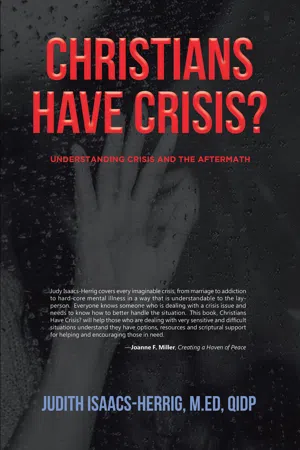![]()
Chapter One
Support for Loved Ones Affected by Mental Illness
Mental illness is a part of all of our lives in one way or another—
It shouldn’t have to be a secret.
—NAMI
We must be more aware of mental illness in the church because 26%, YES – that is 1 in every 4 adults in the U.S. suffers with mental illness. That means it is relevant to everyone. Of the 26% of the adults with mental illness, more than 22% of those cases are severe. At least 50% of all adults will develop depression, anxiety, self-harm, eating disorders, bipolar disorder, PTSD, borderline personality disorder, schizophrenia, or some other mental illness in their lifetime. And with homelessness, 40% are mentally ill with 20–25% have serious mental illness.
Some people do not believe that mental health is real or at least considered a medical illness. But with head scans, medical researchers have found that there are actual differences in the brain of those with and without mental illness. There is biological evidence, therefore it is a medical illness.
Mental illness is common, it is real, and affects all of us. It is nobody’s fault, it is not a spiritual problem, and it is treatable—not curable.
Because there is more than one in four people who suffer with mental illness in the U.S., there is a strong need for educating the community in helping them through mental health and disability issues. It is proven that the church can be a great asset to a spiritual life and offers a higher chance of recovery for those with mental illness. The church can provide support for their caretakers and/or family members. The church can be a safe harbor for everyone!
As a Church
No one is untouched by mental illness. As a church, we need to acknowledge and be more accepting of our own brokenness to be more effective.
Some Christian theologians teach our brokenness is caused by sin. Sin has caused all creation to fall from the perfect state in which God intended it. The world is in bondage to death and decay so that it cannot fulfill its intended purpose. One day, the world will be liberated and transformed. Until then, Christians are to go with Christ into the world where they heal people’s bodies and souls and fight the evil effects of sin in the world (Rom. 8:19–23).
Loving others unconditionally is a response to forgiveness and grace. Those who understand the depth of their sin can understand the depth of forgiveness and mercy God gives us. He rescues believers from eternal death (Luke 7:47).
Talk about brokenness in your teaching and sermons. We are all affected by our own brokenness in one way or another. It is often said that the church is the guiding light for those who feel lost and a hospital for those who are broken. It is important that we remember we are all broken.
There are some people that seem to attract those who need help or guidance. It may feel like a burden when it truly is a spiritual gift. When you understand what your spiritual gifts are, they can be very powerful tools.
Spiritual Gifts
To operate effectively, the church has many roles to fill; from maintenance and bus drivers to musicians, sound system technicians, teachers, leaders, and office staff. God gave every person spiritual gifts and wants them used for His purpose.
Some churches provide training to learn what each person’s spiritual gifts are. Knowing your spiritual gifts will provide spiritual direction. God has given each of you a gift from His great variety of spiritual gifts. Use them well to serve one another (1 Pet. 4:10).
Lead a life worthy of your calling for you have been called by God. Always be humble and gentle. Be patient with each other, making allowances for each other’s faults because of your love. Make every effort to keep yourselves united in the Spirit, binding yourselves together with peace (Eph. 4:1–3).
What if your spiritual gift is leadership yet you do not feel you have the knowledge to take on such role? In Ephesians 4:11–13, Paul writes: These gifts God gave to the church; the apostles, the prophets, the evangelists, pastors and teachers. Their responsibility is to equip God’s people to do his work and build up the church, the body of Christ. This will continue until we all come to such unity in our faith and knowledge of God’s Son that we will mature in the Lord, measuring up to the full and complete standard of Christ.
As a Leader
Throughout the Bible, there is scripture that pertains to the expectations of leadership roles.
Any leader who expects to lift the spirits of others must start with purification. To minister to other people, our hearts must be clean before God (Neh. 12:30).
Christians are not immune from suffering. As a leader, you first need to relate to your own suffering. When we suffer, we often feel as though our pain will never end. But God promises after you have suffered for a time, He will restore, support and ...

